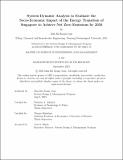System Dynamic Analysis to Evaluate the Socio-Economic Impact of the Energy Transition of Singapore to Achieve Net Zero Emissions by 2050
Author(s)
Lum, Mun Kit Kenny
DownloadThesis PDF (7.250Mb)
Advisor
Nicholas A. Ashford
Distefano, Tiziano
Terms of use
Metadata
Show full item recordAbstract
Singapore has pledged to achieve net zero carbon emissions by 2050. However, due to the country's limited land and lack of natural resources, the transition to net zero emission is a challenging journey. Singapore has chartered an energy transition plan to help the country navigate into a lower carbon footprint future but the plan focuses mainly on the technological challenges that the country needs to overcome to achieve the goal. A System Dynamic model that captures the economy, energy & GHG emissions, and labor market of Singapore was developed to help understand the potential socio-economic challenges that could arise from the energy transition. The results from the model suggest that energy transition needs to be managed through a multi-pronged approach of not just technological changes but also managing efficiencies improvement in labor and energy use as one key issue relates to managing the availability of the skilled labor provided by the local workforce versus increasing the foreign worker ratio in the workforce, especially when new technologies are employed for the energy transition. To combat this challenge, Singapore can consider adopting policies implemented by other countries to improve energy efficiency and labor productivity.
Date issued
2023-09Department
System Design and Management Program.Publisher
Massachusetts Institute of Technology